
Largest Coworking Companies


A few decades ago, coworking spaces made heads turn because they made it possible for individuals to work, connect, and interact with people from different companies, within the same workspace. Today, the coworking space business model has changed slightly. Within the tech industry, people now want the coworking space to be more than just a cool place to work. They want a better facilitator for start-ups. On the ground level, one of the best ways for small to midsized spaces to achieve this is by developing coworking partnerships with local businesses within the community.
Coworking spaces are now moving beyond affordable rents and fancy interiors. Partnering with a nearby local business offers an excellent way to create a mutually beneficial partnership both for the coworking space and the local business.
For instance, if you partner with a barbershop or beauty salon, you can arrange for your members to get discounts, rewards, and special offers from the barbershop or beauty salon as an added perk of joining the space. This encourages your members to frequent your space more regularly while also supporting the barbershop, beauty salon, or any local business nearby with free marketing and more customers.
Some examples of local businesses to partner with include barbershop, print shops, restaurants, gyms, beauty salons, spas, grocery stores, supermarkets, and more. You can also partner with health and medical institutions, financial services, and so forth. Most small businesses are constantly looking for new ways to reach potential customers, so it’s highly likely that they will respond positively to a proposal to partner with a coworking space.
As a coworking manager or operator, it is your responsibility to build mutually beneficial partnerships with businesses within your local community. Here are some actionable steps that can help you approach and build lasting relationships with local businesses within the community.
First, you need to identify the local business you would like to partner with. While there may be a ton of businesses close to your space, not all of them may be ready to partner with you or provide more value to your members. How do you know the right one for your coworking space? Questions to help you identify the right local business include:
With these questions, you can identify the right business to foster coworking partnerships with.
Next, you need to meet with the other business managers or operators to propose your idea and help them understand the benefit of the partnership to their business and your coworking space. This can be done as an individual or group presentation. The benefits for potential partners can include a boost in revenue, free advertising and marketing, generating new leads, supporting the local economy, and so forth. With a clear understanding of the benefits, all parties involved will be motivated to come on board. The more detailed numbers and deliverables you can provide them, the better!
Finally, it’s time to make the deal. In order to negotiate a favorable outcome, it is essential that you are on top of your outreach scores. Enter the negotiation with a full list of your members, growth potential, and so forth.
Once you get an agreement, ensure that every detail of the partnership is well-documented. This includes the number of sample products, discount on services, special offers for members, and so forth. However, making the deal is never straightforward. It might be helpful to start the partnership with a limited trial period, so that both businesses can review the results and see if the benefits are actually worth the effort. You may also need to give the other parties some time to think about it.
There you have it! Above are a few of tips to help you build lasting relationships for your coworking space with local businesses within the community. Creating a selfish partnership will not set an excellent example for your coworking space business within the community. The best coworking partnerships are those that have the interest of your customers, the local business, and the community at heart.
Save your community manager 41 hours each week—learn how The Yard did it with cloud-based access control.
Read the Case StudyFree access to our best guides, industry insights and more.
